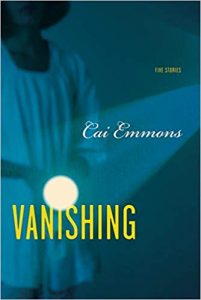Lessons From a Story Collection: The Smashing of False Beliefs
False Belief #1: I am only a novelist.
I am a novelist—I did not intend to write a short story collection. I write what I love to read, and since I was a young child that has been novels. I used to lie on my side on my bed, elbow bent, head resting in my hand, and read for hours while my mother hounded me to get outside. There was nothing I loved more than escaping into a big immersive book.
am a novelist—I did not intend to write a short story collection. I write what I love to read, and since I was a young child that has been novels. I used to lie on my side on my bed, elbow bent, head resting in my hand, and read for hours while my mother hounded me to get outside. There was nothing I loved more than escaping into a big immersive book.
It was only natural that, when I became a writer, the ideas that came to me were ideas for novels. When I entered graduate school, it became necessary to write stories. Workshop situations can only handle a certain number of pages, and writing shorter pieces is an efficient way to explore aspects of the writing craft. So, I wrote some short stories during my years as a student. I approached them mostly as exercises, but I began to appreciate the micro focus and concision a good short story demands.
When I left grad school I focused on the writing of novels, but every once in a while, in the twenty years since then, an idea has come to me that is clearly a story not a novel, and I have written it in my rambling novelist’s way. In my head, however, my real mission was the writing of novels and writing stories remained an exercise.
However, a little over a year ago I was perusing the stories that had accumulated in my computer—a few had been published, a few had only been read by close friends—and it occurred to me that there was a clear thread that connected some of the stories. I gathered five of them and knew immediately that they cohered as a collection, despite the fact that I’d written them over a span of twenty years. I sent the collection off to a contest on a whim and was shocked, truly shocked, when it won with the promise of publication. A long-held false belief was smashed. Maybe I could be a novelist and a short story writer?
False belief #2: I am always writing something new.
I think many writers feel as I do, that each time I take up another project I am exploring something new. I never reread my published work to prove that point, so the belief has gone unquestioned, but when re-examining my stories I saw something different. It became clear to me that, for most of my writing life, I have been probing the same basic question: What does it mean to live as a woman in this culture? I never committed to this consciously, it was merely a matter of writing the story that came to mind and seeing what it brought to light. I have certainly been approaching the question from different angles, but the thematic undercurrent, the dianoia of my work, is quite consistent.
The five stories in Vanishing are a case in point. In “The Deed,” for example, a woman is so timid and uncertain about who she is in the world that she cannot even assert ownership over her own house. In “Fat” an aspiring young artist with body issues is forced to reckon with her own judgment of the fat model in her art class. All the situations of the central characters in these stories are unique to women navigating lives in a culture that undervalues them.
How could I not have realized that I was returning again and again to this central question?
False Belief #3: Staying with one form of expression is the best way to “improve.”
Since I’ve been writing novels I am aware of getting better at the discipline. I have novels in a drawer that have never seen the light of day, and I am quite sure they should remain comfortably sleeping there. I have a couple of new novels in the pipeline each of which I believe demonstrates some kind of advancement in my command of the form: more seamless plotting, more concise and evocative language, more profound relevance to the human condition.
But since birthing this story collection so unexpectedly, something else has occurred to me: Maybe I would benefit from writing in different genres. Not just short stories, but poems and plays. My evolution as a novelist had its roots in dramatic writing and, before that, poetry. Why not return to some of those forms periodically to reframe my view of how the written word can function? Why remain exclusively in the novel writing gulag?
My thinking has gone even further than that. Why not attempt some different kinds of art-making which would involve learning new skills? I have always wanted to learn to draw and paint, but I’ve been afraid to try. I also love to dance, but long ago I left behind any disciplined approach to dancing. What if I were to take a drawing class, or learn to tango or tap dance? Doing these things would wire my brain differently, just as language-learning does, and no doubt it would widen and refresh my view of the world.
I have not extended myself yet, but maybe soon, because putting together this story collection has changed me, smashing through a long-held belief that I am a person who does—and should do—only one thing.
—
Weather Woman (novel)
Vanishing (story collection), March 2020
Cai Emmons is the author of five books of fiction: the novels His Mother’s Son, The Stylist, Weather Woman, and the forthcoming Sinking Islands, as well as a collection of short stories called Vanishing, winter of the Leapfrog Press Fiction Contest, to be published in early 2020. His Mother’s Son won the Ken Kesey Award for the Novel; Weather Woman was awarded a Nautilus Book Award and was shortlisted for the Eric Hoffer Grand Prize. Cai’s short work has appeared in such publications as TriQuarterly, Narrative, Arts and Culture, LitHub, and Electric Literature, among others.
Before turning to fiction, Cai was a dramatist. Her early plays (Mergatroid and When Petulia Comes) were staged in New York at Playwrights Horizons, Theatre Genesis, and The American Place Theater. She studied film at NYU’s Tisch School of the Arts where her ‘thesis film’ won a Student Academy Award. In New York she wrote, directed, and edited independent and documentary films (aired on A&E and PBS); subsequently she moved to Los Angeles where she wrote feature-length screenplays (optioned but unproduced) and several produced teleplays, including episodes of the CBS drama “The Trials of Rosie O’Neill.”
In addition to a bachelor’s degree from Yale University, Cai holds two MFAs, one in film from New York University, one in fiction from the University of Oregon. She has taught fiction, screenwriting, and filmmaking at various colleges and universities including UCLA, the University of Southern California, and the University of Oregon. She is now a full-time writer.
Twitter: @caiemmons
Facebook: @caiemmons
Weather Woman Page: @WeatherWomanNovel #WeatherWomanNovel
Instagram: @caiemmons
Website www.caiemmons.com or www.caiemmonsauthor.com
VANISHING, Cai Emmons
 The characters in these stories operate in a world in which their voices are not heard, and are navigating prickly paths, doing what they can to survive.
The characters in these stories operate in a world in which their voices are not heard, and are navigating prickly paths, doing what they can to survive.
An attorney, mother of twin babies, is destabilized when her husband is away, and comes to doubt she has a right to her own house; a young artist thinks she knows the score when she moves from LA to New York, only to be forced to look past stereotypes to discover what really matters; a documentary filmmaker, rattled by her recent divorce, visits her oldest childhood friend, who is several years into debilitating dementia, and realizes how quickly shared history can vanish; a woman in her twenties who feels on the outside of everything forms a manipulative friendship with a mother aggrieved by her daughter’s recent death; and an office manager approaching middle age is taken aback when she realizes she isn’t central in the lives of her young male employees, whom she always thought adored her.
These five women’s lives speak to the difficulty of honing a strong identity in a culture that consistently devalues women.
Sophisticated and bright with promise…these stories elucidate incredibly difficult-to-articulate topics such as jealousy, self-hatred, unlikely connection and friendship.… If a writer’s job is to make the unseen visible, the stories in VANISHING are flashlights, illuminating the subtle, enormous tragedies we humans encounter every day.—Marie-Helene Bertino, author of 2 A.M. at the Cat’s Pajamas
Praise for Cai Emmons’ novels
Gripping. Brings home the power and terror of maternal love. —O Magazine
Emmons…has an eye for the grating intimacy of small-town life and a fine ear for suggestive metaphors.… Unusual and memorable. —The Economist
Lovely writing… Emmons’ emphasis is on her characters, and she draws them well. —Seattle Times
With family relations as twisted as a French braid and language as vivid as a platinum dye job, Emmons’ potent novel features magnetic characters and complex and compelling secrets. mdash;Booklist
A gift of a book, an affecting story of violence and forgiveness.—Bookpage
Accomplished playwright and filmmaker Emmons tests chilly waters in this ambitious, unsettling debut.—Publishers Weekly
Gorgeous writing throughout makes for an unusually affecting and memorable debut. —Kirkus Reviews
BUY THE BOOK HERE
Category: On Writing






























